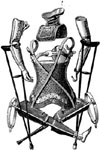
How Scientific Pride & Idolatry Blot Out the Perception of God
SCIENCE'S SIN OF THE EYES
Even the most secular of secularists inadvertently betray a belief in God. An assumption of the existence of God underlies all search for the truth, however buried that assumption may be, however oblivious the searcher. In the case of the secularist, unfortunately, this unconscious recognition of God stems, not from humility, but from pride, for the person assumed to be God is the secularist himself.
+ + +
According to “The Self-Reproducing Inflationary Universe” by Andrei Linde, in the March 1998 Scientific American, the cosmos consists of “an extended branching of inflationary bubbles.” These “bubbles” are “universes” that branch as each universe gives rise to others in an “eternal inflation” that makes the entire cosmos “immortal.” What a magnificent cosmos Linde has conjured, having taken on characteristics traditionally associated with God.
We cannot see out of our universe, and it’s unlikely that inhabitants of any other universe could see ours, but Linde, undaunted, has drawn a picture of this immortal and eternally inflating cosmos. From a tiny yellow bubble at the bottom, three universes branch off, two red and one blue. These branch in turn, forming five more universes, which themselves branch into still more universes, one of them green. “Changes in colors,” explains Linde, “represent ‘mutations’ in the laws of physics ….”
If our universe is 1/4-inch in diameter in Linde’s picture and 10 billion light-years in actuality, and if we look at the picture from a distance of, say, 15 inches, then Linde has implied a point of view 600 billion light-years outside our universe. We cannot leave our universe or even see outside it, but Linde has imagined himself more than half a trillion light-years outside of everything we know about or could know about. He has also caused us to imagine the same point of view, and to imagine it calmly, as if this impossible and vertiginous aerie, which could admit none but the immortal and eternal, were our ordinary perch.
You May Also Enjoy
Contemporary scholars are so anti-religious, or a-religious, that they block out the huge role religion played in the past.
An Ocean Full of Angels... The Artistic Links Between William Shakespeare and Sir Thomas More: Radically Different Richards
Shakespeare showed what murder does to murderers. We, too, can examine what abortion has done to abortionists and the mothers and fathers of those killed.

